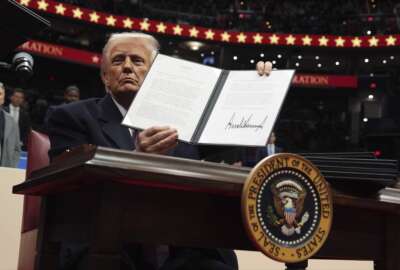Agencies cut improper payments by $18 billion
Most of the fiscal 2011 reductions came from the departments of Education, Agriculture and Health and Human Services. The administration also announced new steps...
wfedstaff | June 4, 2015 2:01 pm
By Ruben Gomez
Reporter
Federal News Radio
Agencies saved nearly $18 billion in fiscal 2011 by reducing improper payments, the White House announced Tuesday. The administration also unveiled new steps to prevent the government from paying money to the wrong people.
Agencies saved $17.6 billion last year, by reducing payment errors in Medicare, Medicaid, Pell Grants and a food assistance program.
President Barack Obama initiated the crackdown on improper payments two years ago, when he gave agencies the goal of reducing payment errors by $50 billion before 2013. The effort has since become part of the administration’s Campaign to Cut Waste, which seeks to apply lessons learned by the Recovery Accountability and Transparency Board to all federal spending.
“Because of the sustained commitment from the President, the Vice President, and leaders across the administration — and the effective use of technology — we are seeing real progress cracking down on this waste of taxpayer dollars that has persisted for far too long,” said Jack Lew, director of the Office of Management and Budget. “Through aggressive and innovative solutions being deployed by federal agencies, we are on track to meet the President’s bold directive to prevent $50 billion in payment errors by the end of 2012. This is a good step, but not the end. We will continue to work day and night to prevent taxpayer dollars from being wasted in payments to the wrong people or in the wrong amount.”
As part of the crackdown, agencies reduced the 2011 governmentwide payment error rate to 4.7 percent, the administration said. In 2010, it was 5.3 percent.
The Medicare and Medicaid programs shouldered the bulk of savings, avoiding $16 billion in payment errors, Health and Human Services Secretary Kathleen Sebelius told reporters.
USDA also prevented $800 million in improper payments under its Supplemental Nutrition Assistance Program, formerly the food stamps program, according to the administration.
“These results were driven by successes in specific programs where results are improving because federal agencies are increasing scrutiny of payments by initiating more robust audits, leveraging new technologies, or building partnerships with States focused on improved program integrity,” the White House stated.
Technology improvements at Education prevented about $300 million in improper Pell Grant payments, the administration said. Officials crafted a way for financial aid applicants to pull tax information from IRS databases into their aid applications, reducing the chance for error.
New steps for agencies to reduce improper payments
In announcing the reduction of payment errors, the White House also revealed new steps to improve agency suspension and debarment programs.
Agencies must:
- Appoint a senior official responsible for “assessing the agency’s suspension and debarment program, including the adequacy of available training and resources,” Lew said in a memo. The official also will ensure “that the agency maintains effective internal controls and tracking capabilities, taking into consideration the agency’s mission, organizational structure, and level of procurement and grant-making activities.” The senior official must ensure the agency participates regularly in the Interagency Suspension and Debarment Committee.
- Review internal practices to ensure that potential contractors and grant recipients have the requisite business integrity.
- Ensure award officials review relevant databases and other information sources, before choosing contractors and grant recipients.
“The federal government pays over a trillion dollars a year to contractors and grantees, and has an ongoing fiduciary responsibility to protect American taxpayer resources and the integrity of the processes for federal acquisition and for discretionary assistance, loan, and benefit programs,” Lew said.
Sen. Joe Lieberman (I-Conn.) said the new guidelines would provide “sufficient direction” to agencies.
“The failure of agencies to use tools already available to them to prevent waste, fraud, and abuse suggests that tougher Congressional oversight is needed, and the Homeland Security and Governmental Affairs Committee will be knocking on doors to ensure these new guidelines are followed,” Lieberman said in a statement.
RELATED STORIES
White House announces plan to cut government waste
CMS to take on improper payments in new way
OMB: $687M recovered in improper agency payments
Copyright © 2025 Federal News Network. All rights reserved. This website is not intended for users located within the European Economic Area.





